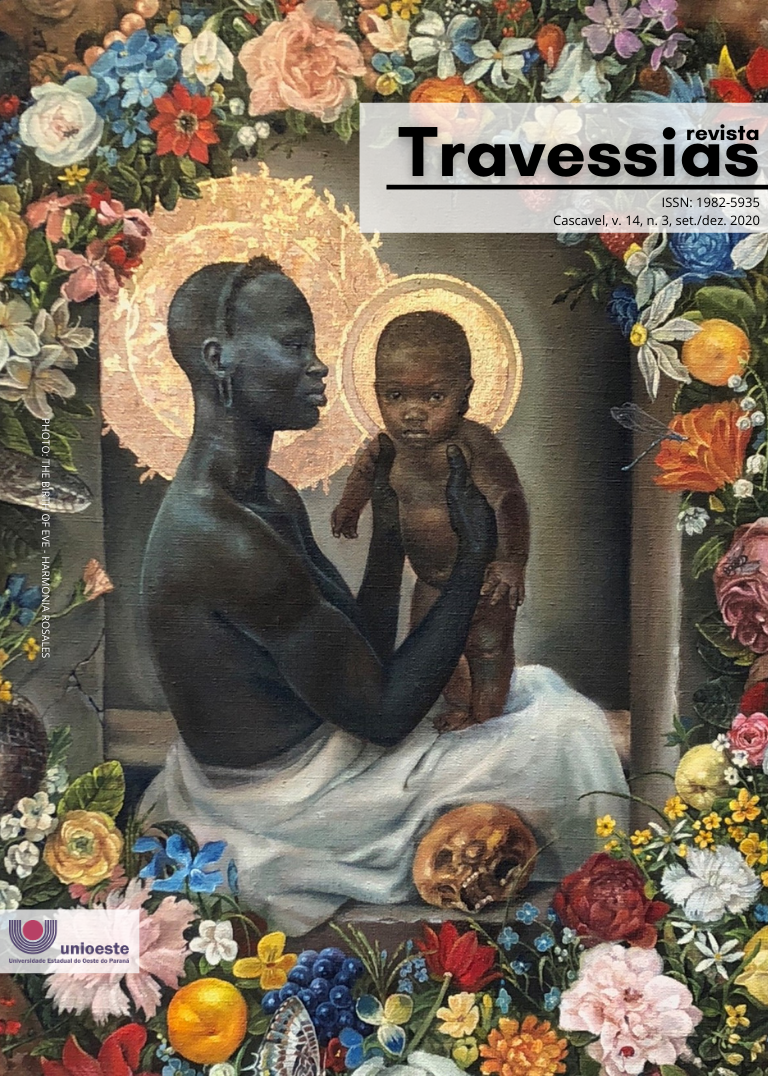Resistance and denunciation against racism/male chauvinism in the voice of black women poets
DOI:
https://doi.org/10.48075/rt.v14i3.26349Keywords:
Afro-feminine poetry, voices women, resistance, complaint.Abstract
This article focuses on Afro-Brazilian poetry written by the poets Conceição Evaristo and Esmeralda Ribeiro as a tool of resistance against structural racism that, historically, sustains Brazilian society, to the point of camouflaging the extermination of black youth, silencing, erasure and murders of black men and women, almost considered as natural. In addition to these ailments, there are those of misogyny and male chauvinism that plagues the lives of Brazilian women in general, with a particular grievance for the black woman, considered as the other's other, who can then be the object of mistreatment or mere animal laborans. In these conditions, the poor visibility of these two poets, who carry out resistance and denunciation in a lyrical voice, is exposed and faced discursively. As a method, we will make use of comparative literature, and the analysis and interpretation of the chosen poems will have a theoretical scope in Adorno (2003); Goldstein (1985), Martins (2000) among others, and in studies that deal with the black trajectory in the national literature, such as Proença Filho (2004) and Duarte (2018). The poetic work carried out by the poets brought here presents, in addition to all the beauty of their aesthetics, a unique historical perspective, which starts from the look of the black woman nourished by verses overflowing with strength and resistance as true political acts of denunciation and exposure against centuries of discrimination against blacks and black women.Downloads
References
ADORNO, Theodor. “Palestra sobre lírica e sociedade”, Notas de literatura I. Trad. Jorge de Almeida. São Paulo: Duas Cidades; Ed. 34, 2003, p-p 65-89.
ALMEIDA, Silvio Luiz de. O que é racismo estrutural? Belo Horizonte: Letramento, 2018.
AUTHIER-REVUZ, J. Heterogeneidade(s) enunciativa(s). Cadernos de Estudos Lingüísticos, Campinas, SP, v. 19, p. 25-42, 2012. DOI: 10.20396/cel. v19i0.8636824. Disponível em: https://periodicos.sbu.unicamp.br/ojs/index.php/cel/article/view/8636824. Acesso em: 29 dez. 2020.
BERND, Zilá. Introdução à literatura negra. São Paulo: Brasiliense, 1988.
BERND, Zilá. (Org.). Poesia negra brasileira. Porto Alegre: AGE/IEL, 1992.
CADERNOS NEGROS. Os melhores poemas. Organização Quilombhoje. São Paulo: Quilombhoje / Fundo Nacional da Cultura, Ministério da Cultura, 1998.
DUARTE, Eduardo de Assis. Mulheres marcadas: literatura, gênero, etnicidade. Terra roxa e outras terras In: Revista de Estudos Literários. Volume 17-A (dez. 2009) - ISSN 1678-2054. Disponível em: http://www.uel.br/pos/letras/terraroxa- Acesso em: 14 dez. 2018.
EVARISTO, Conceição. Poemas da recordação e outros movimentos. Rio de Janeiro: Malê, 2017.
GOLDSTEIN, Norma Seltzer. Versos, sons, ritmos. Editora Ática, 1985.
MARTINS, Nilce S. Introdução à Estilística. 3ª Ed. São Paulo: T. A. Queiroz, 2000.
MBEMBE, Achille. As formas africanas de auto-inscrição. Estudos afro-asiáticos, Rio de Janeiro, v. 23, n. 1, p. 171-209, Jun 2001. Available from hhttp://www.scielo.br/scielo.php?script=sci_arttext&pid=S0101-546X2001000100007&lng=en&nrm=iso>. Acessado em 29 Dec. 2020.
POLLAK, Michael. Memória e Identidade Social. Estudos Históricos, Rio de Janeiro, v. 5, n. 10, p. 200-212, 1992.
PROENÇA FILHO, Domício. A trajetória do negro na literatura brasileira. In: PROENÇA FILHO, Domício. Estudos Avançados, vol. 18 n°50, 2004. p. 161-193.
RIBEIRO, Djamila. Quem tem medo do feminismo negro? São Paulo: Companhia das Letras, 2018.
RIBEIRO, Esmeralda. Cadernos Negros: os melhores poemas. 1998p. 64-66)
RIBEIRO, Esmeralda. Literafro: o portal da literatura afro-brasileira. Disponível em: http://www.letras.ufmg.br/literafro/autoras/244-esmeralda-ribeiro/ Acesso: 14 dez. 2020.
SOUZA, Duda Porto & CARARO, Aryane. Extraordinárias. Mulheres que revolucionaram o Brasil. 1a ed. São Paulo: Seguinte, 2017.
VILARIÑO, Idea. La masa sonora del poema. Montevideo: Biblioteca Nacional, 2016.
Downloads
Published
How to Cite
Issue
Section
License
Creative Copyright Notice
Policy for Free Access Journals
Authors who publish in this journal agree to the following terms:
1. Authors keep the copyright and grant the journal the right of first publication, with the work simultaneously licensed under the Creative Commons Attribution License, which allows sharing the trial with acknowledgment of authorship and initial publication in this journal.
2. Authors are authorized to take additional contracts separately, for non-exclusive distribution of the work version, published in this journal (eg publish in institutional repository or as a book chapter), with acknowledgment of authorship and initial publication in this journal.
3. Authors are allowed and encouraged to publish and distribute their work online (eg in institutional repositories or on their personal page) at any point before or during the editorial process, as this can generate productive changes, as well as increase both impact and citation of the published trial (See The Effect of Free Access).
Creative Commons License
This work is licensed under a Creative Commons Attribution–NonCommercial-shareaswell 4.0 International License, which allows you to share, copy, distribute, display, reproduce, completely or part of the work, since there is no commercial purpose, and authors and source are cited.



